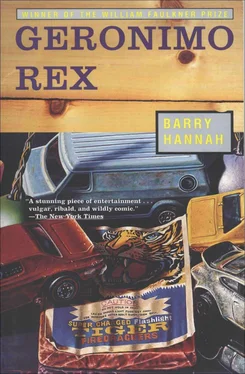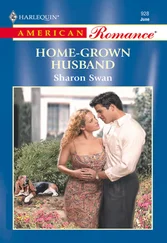I lay down in my T-bird. My eyes were wet, and I had to drag out the old handkerchief, looking out at those silvery streetlights on Highway 51, and over at the Ole Miss medical center, its new spring campus rising toward the lights, its big lazy trees, its rolled green. You felt that the moon in the blue was the old drawing master of it all. Goodbye Bach, Handel, Haydn, Beethoven, Manfredini, Mozart, Vivaldi, Purcell, and Borodin, I was thinking. Then I sat up and told all European music to go to hell.
I had jazz and miles of blues and an endless trek of rhythm in me. I got my shades out of the glove compartment and put them on, even in the night Then I went sailing away, in a thunder of leaking mufflers. Let the gas and the ass spill, no top on my car. The young May wind took all sweat and all tears off me, and Jackson was a deep greenery with intersections of orange and gray, by what showed through my shades.
I didn’t tell Livace about being kicked out of the symphony. He was my instructor and he’d gotten me the place. He used to be first chair with the symphony, but now he didn’t have the time. When he sent me over, he told me what I ought to do was listen for a couple of years. I asked him why I would need to carry my horn over with me. He said I should finger the notes and think the tones. I could actually play at forte markings and above. This was the way he had learned, with the Minneapolis Symphony, and when he’d begun actually playing, he never missed a note or was out of tune and moved swiftly up to first chair. Among the musicians of Minneapolis, it was known that he had never missed a note or tone. I thought of Livace as a statue of a man with a trumpet to his lips in some cold Minneapolis park.
At first I couldn’t figure why Livace didn’t have the time to play with the symphony any more. He was another Italian who dragged his darling fathomlessly intricate culture around with him, like a tail; he was Catholic, he had to drive to Jackson for mass, since there was no Catholic church near Hederman sever, and his weak old De Soto stalled out on him perpetually, but further than that, he was scared , and I knew it One day in his office, he was so scared that he spoke to me as if I was his last friend. To get his doctorate in music he had borrowed money from the Mafia. Now he had a family and could afford to pay back, at the most, only two-thirds of the monthly note they wanted; there was quite an interest on the loan. He knew he wasn’t sending his payments to people who sat around in offices writing letters to him about how much he was lacking. He expected that, at the least, one day he would come to this office and there would be an angry muscular creature laying for him. Livace kept one of those giant economy bottles of aspirin on his desk and ate from it — he always ran a fever, you could see it in his ears. He looked something like Sid Caesar, the comic, and like Sid, sweat and fever were his realm. One afternoon he wanted me to take his monthly payment to the post office; it was a heavy envelope, packed with green cash, I could tell. After I got back, he asked me if I knew what I’d done. I said I’d mailed a lot of money for him, is what I’d done.
“What you have just done is mail the money I needed to pay for a hernia operation on my baby son.”
Aside from this sort of thing, though. Livace could play the fanny off a trumpet. He’s the best straight virtuoso I’ve ever heard. When he taught, it was by a glib performance by the one and only Livace himself. Try to match me, he said. His eye would lie on the music like the dead eye of a fish, he would take in the music by that one eye, and out the end of the horn came a spray of notes not only correct, but sweet, spangling. I’d be in the practice cell across from him, blasting away at a passage, and hear steps coming my way. He’d have his own horn, a Bach Stradivarius, and give me the courtesy of a chuckle, then bend that dead eye down and render the passage so well you wanted to retire to comb and tissue paper.
But one day I’d forgotten him, tooting away, thinking I was lovely, I was in the stars in my own Milky Way. Somebody grabbed my ears and jerked them outwards painfully. I could smell the aspirin on his breath.
“Aren’t you hearing all those bad notes? Don’t you know you must have ears to be a musician? You’ve been out of tune on every note above middle C for the last fifteen minutes.”
“Get your hands off my ears.”
Then there was nothing between Dudi and me. I didn’t care if he had believed in my promise ever since hearing me at the contest in Shreveport, that I was supposed to transmute into a genius under this care. Just no more hands on my ears, please. Stuff his care. Some afternoons I sat in the cell and stamped out as many cigarette butts as possible in front of the wire stand with the page of music Livace set up for me. Sometimes he’d insult me by putting up some whole-note exercises from the Baldwin primer; next it would be a piece so black with runs it was impossible, in a freakish key, five flats and such. When I felt like it, I’d just play jazz, play the blues loud and watery with the door open. Dudi gave up then. I’d hear him locking up with great assertion; lights went out in the nearby rooms. When I heard him on the stairs, I moved out to the top of them and bellowed and blatted to give him a fine sopping echo—“La Cosa Nostra Blues,” had he asked me. Probably he was afraid to ask about my progress in the Jackson Symphony.
Patsy Boone had not given up on me. I took her out. One night in the parking lot of the Dutch Bar, having kissed most of her visible body and bored to tears, I was lying dismally face-down in her hair. She told me how she missed me at rehearsals, she told me she wanted me and me only in her hair. I poured off some of the beer over her head. “Oh, my valentine, anything!” as I fell into the matted strands.
I was Romeo of the Roaches again, eating the lamb patties of her hands, licking her yellow hair. I grabbed her thigh ruthlessly, put my hand around the ankle of the other leg. I need you, I said. Bored, but having at it as the male of the species. I’d been trained. My owner was crying, Get out there and perform, you simple hairball; finger out of the nose, now, no lifted hindfoot, no dicking off! Everyone’s paid to see you! Up on the trike! Ride! Be a man. Flick of the whip there about the scrot to give yer a little spirit. El Humanoido, the trained link of evolution! I’d fallen into the floor pedals and was sprawled over the gear-hump of the T-bird, yanking at her skirt Not here in the parking lot with the top down, she cried. Besides, it was starting to rain.
On the way to her apartment, she had second thoughts. She told me she was virginal and wanted to have passion with me in the clear light of reason. It should be no drunken thing like this. Touching was too precious. I should come to see her on Sunday. The light in her room would be on and she might bring in other lamps.
It seems I exuded an exotic melancholy — her words — that undid her. When I’d played the “Habañera,” sob, she’d kissed my heart. How long she’d been trying to meet her eyes with mine! She’d gone out with another boy who sort of looked like me. But he had no heart like she wanted to put her tongue on.
“And then many nights I’d think of you while I was lying in bed, and I’d have an erection,” she said.
I just turned my face and looked up in the blue night when she said that. I didn’t know about going to her place Sunday, although I was flattered to the point of torment by her confession of love. I let her out at an old white house on Titpea, off North State, and she ran, like an injured lark, alone, to her apartment, as she said she wanted to.
Читать дальше












